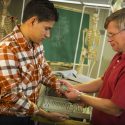American Indian workshop promotes dialogue on breaking stereotypes
An Anishinaabe prophecy called the Seven Fires offers seven predictions of what the future would bring, and “the time of the seventh fire” can either lead to a worldly sense of community and unity or the destruction of humanity.
The American Indian Studies and Education workshop, held on Nov. 19 from 10 a.m. to 4 p.m. at the UW–Madison Red Gym, will explore that tradition and others in the hope of leading participants down a road toward unity and community.
“Recent conflicts regarding tribal gaming, land into trust, mascots and other issues demonstrate an ongoing need for greater dialogue and understanding,” says UW–Madison School of Education Student Services Coordinator Virginia Waddick.
“Participants in the workshop will learn about the impact of bias and stereotypes of American Indians in educational and other materials, helping to expand perspectives on history, current social issues, and what counts as knowledge in schools,” adds Waddick.
The School of Education designed the workshop in partnership with Associate Dean Ken Zeichner and J.P. Leary, the workshop presenter and consultant for the Department of Public Instruction (DPI) American Indian Studies program. The workshop will encourage teachers to integrate American Indian education issues into the school curriculum. The workshop also looks to support these issues in teacher training programs.
“This will be the first year that I will have done an all-day session like this on the UW–Madison campus,” Leary said. “The day’s activities will begin with an interactive presentation illustrating the need for accurate, authentic information about American Indians.”
Workshop participants will learn about Wisconsin tribal sovereignty issues and view the documentary “Lighting the Seventh Fire.” The 1994 documentary addresses the backlash from white protesters after Northern Wisconsin Chippewa were allowed to spearfish.
Participants will also have a chance to view accurate, authentic instructional materials from the Great Lakes Inter-Tribal Council, the Wisconsin Historical Society, the Educational Communications Board and DPI.
The workshop and DPI’s American Indian Studies program seek to inform students and participants about the rich heritage of the tribes and bands in Wisconsin. Registration for the workshop is being coordinated through the Education Academic Services office. Interested participants can contact Waddick at (608) 262-1177, or vwaddick@education.wisc.edu.
For more information, visit the School of Education’s Multicultural Education program Web site or the DPI Web site.

